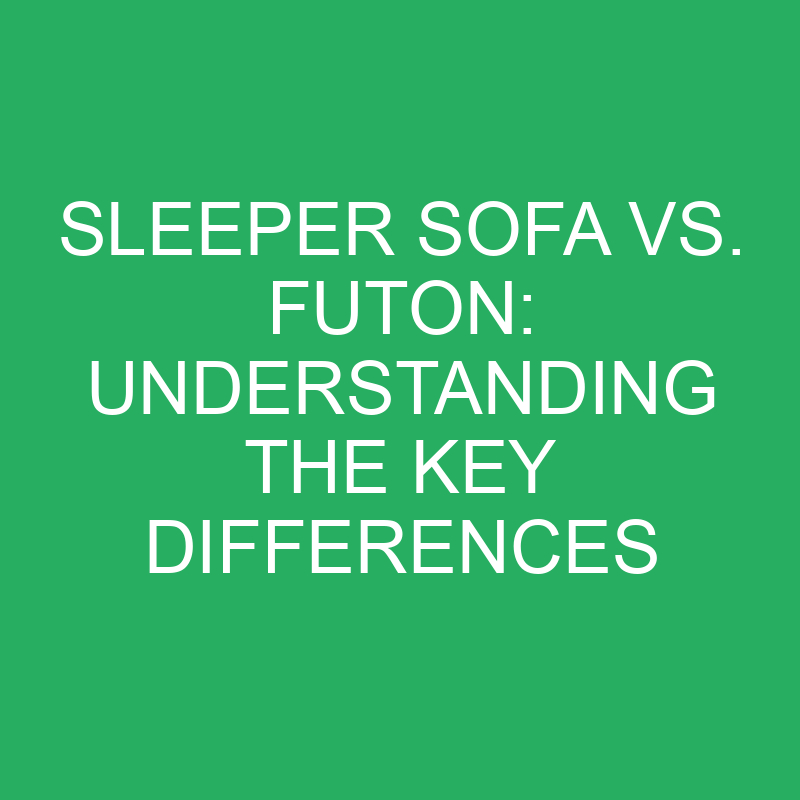
Looking to add some versatility to your living space? Then you might be considering a sleeper sofa or a futon. While both options serve as functional pieces of furniture that can double as a bed, there are some key differences between the two. In this article, I’ll break down the distinctions between a sleeper sofa and a futon, helping you make an informed decision for your home.
When it comes to style and design, sleeper sofas offer a more traditional and sophisticated look. With their upholstered frames and hidden mattress, they seamlessly blend into any living room or guest room. On the other hand, futons have a more casual and contemporary vibe, often featuring a simple metal or wooden frame and a mattress that can be easily folded or rolled up. So, if you’re aiming for a sleek and modern aesthetic, a futon might be the way to go.
Another important factor to consider is comfort. Sleeper sofas typically provide a more comfortable sleeping experience, as they often come with a built-in mattress that offers more support and cushioning. Futons, on the other hand, tend to have a thinner mattress that may not be as comfortable for long-term use. However, if you’re primarily looking for a space-saving seating option that can occasionally be used as a bed, a futon can still be a practical choice.
The choice between a sleeper sofa and a futon ultimately depends on your personal preferences and needs. While sleeper sofas offer a more elegant look and superior comfort, futons are a versatile and space-saving option. By considering factors like style, comfort, and functionality, you can make an informed decision that best suits your lifestyle and home decor.
Style and Design
When it comes to style and design, sleeper sofas and futons offer different aesthetics that can complement various interior design styles.
Sleeper Sofas: These pieces of furniture often have a more traditional and sophisticated look. They come in a range of styles, from sleek and modern to elegant and classic. With their plush upholstery, intricate detailing, and elegant finishes, sleeper sofas can add a touch of luxury to any living space. They are available in a variety of colors and patterns to suit different preferences and can easily blend in with existing furniture.
Futons: On the other hand, futons have a more casual and contemporary vibe. They are characterized by their minimalist design, clean lines, and versatility. Futons often have a streamlined appearance, making them a great choice for smaller spaces or rooms with a modern aesthetic. They are available in a range of materials, including leather, fabric, and even wood, allowing for customization and flexibility.
Overall, the style and design of sleeper sofas and futons are key factors to consider when choosing between the two. If you prefer a more traditional and sophisticated look, a sleeper sofa would be a great fit. Alternatively, if you are looking for a contemporary and versatile piece, a futon might be the better option.
In the next section, we will dive into the comfort aspect of sleeper sofas and futons to help you make an informed decision.
Comfort
When it comes to comfort, both sleeper sofas and futons have their own advantages and considerations. Here are some factors to consider:
- Sleeping Experience: Sleeper sofas typically offer a more comfortable sleeping experience. They are equipped with a built-in mattress that can range from standard to high-quality options. This means that you can enjoy a restful night’s sleep without feeling any discomfort from the sofa’s frame. On the other hand, futons usually have a thinner mattress that may not provide the same level of support and comfort. While some people find futons comfortable enough for occasional use or short-term stays, they may not be ideal for long-term use as a bed.
- Seating Comfort: Both sleeper sofas and futons can provide comfortable seating options during the day. However, sleeper sofas often offer more cushioning and support due to their construction and the presence of a mattress. This can make them more suitable for extended periods of sitting or lounging. Futons, on the other hand, tend to have a firmer seating surface due to their thinner mattress. While some individuals prefer the firmer feel of a futon, others may find it less comfortable for extended periods of sitting or relaxing.
- Customization: Another aspect to consider is the ability to customize the comfort level of your furniture. With sleeper sofas, you have the option to choose from different types of mattresses, such as memory foam or innerspring, to suit your personal preferences. This allows you to tailor the comfort level to your liking. On the other hand, futons generally have a fixed mattress that cannot be easily replaced or customized. However, you can still enhance the comfort by adding a mattress topper or padding.
Sleeper sofas generally offer a more comfortable sleeping and seating experience compared to futons. The built-in mattress provides better support and cushioning, making them suitable for long-term use as a bed. However, futons can still be a viable option for those who prefer a firmer feel or have limited space. Ultimately, the choice between the two depends on your personal preferences and needs.
Functionality
When it comes to functionality, both sleeper sofas and futons serve the purpose of providing a comfortable seating option during the day and a convenient bed for overnight guests. However, there are some key differences between the two that can impact their overall functionality.
Sleeper Sofas
Sleeper sofas are known for their versatility and elegance. They typically feature a sturdy frame with a mechanism that allows the backrest to fold down, transforming the sofa into a bed. These sofas often come with a built-in mattress that provides a comfortable sleeping surface. The great thing about sleeper sofas is that they come in a variety of sizes, making them suitable for different spaces and needs.
One of the main advantages of sleeper sofas is the range of mattress options available. You can choose from various types of mattresses, including memory foam, innerspring, or even air mattresses, depending on your personal preferences and needs. This means you can customize the level of comfort and support to ensure a good night’s sleep for your guests.
Futons
Futons, on the other hand, offer a more minimalist and space-saving design. They consist of a mattress that folds in half to create a seating surface during the day and unfolds into a bed at night. Unlike sleeper sofas, futons do not typically come with a separate mattress. Instead, they have a thinner mattress that may not provide the same level of support and comfort for long-term use.
While futons may not offer the same level of comfort as sleeper sofas, they do have their own advantages. The simplicity of their design allows for quick and easy transformation from sofa to bed, making them ideal for small living spaces or areas where flexibility is a priority. Additionally, futon frames are often adjustable, allowing you to change the seating position to suit your comfort preferences.
Ease of Use
Both sleeper sofas and futons have their own advantages in terms of ease of use. Sleeper sofas generally require more effort to convert from sofa to bed since they have a more complex mechanism. However, this also means that they often provide a more solid and stable sleeping surface compared to futons. On the other hand, futons are typically easier to operate, as they only require unfolding the mattress.
Conclusion
After discussing the differences between sleeper sofas and futons, it is clear that both options have their own unique advantages and considerations.
Sleeper sofas offer versatility and elegance, with a sturdy frame and a mechanism that allows for easy transformation from a sofa to a bed. They often come with a built-in mattress that can be customized for comfort. On the other hand, futons have a more minimalist design and are ideal for small living spaces or areas where flexibility is a priority. They are easier to operate and can be folded into a seating surface during the day and unfolded into a bed at night.
When choosing between a sleeper sofa and a futon, it ultimately comes down to personal preferences and needs. Consider factors such as the amount of space available, the desired level of comfort, and the frequency of use.
Both sleeper sofas and futons offer practical solutions for accommodating overnight guests or creating additional sleeping space. By understanding the differences between these two options, you can make an informed decision that suits your lifestyle and home.
Frequently Asked Questions
What are the main differences between sleeper sofas and futons?
Sleeper sofas are known for their versatility and elegance, with a sturdy frame and a mechanism that allows the backrest to fold down, transforming the sofa into a bed. They often come with a built-in mattress that provides a comfortable sleeping surface. On the other hand, futons have a more minimalist and space-saving design, with a mattress that folds in half to create a seating surface during the day and unfolds into a bed at night.
Do sleeper sofas come with a separate mattress for sleeping?
Yes, sleeper sofas often come with a built-in mattress that provides a comfortable sleeping surface. There are various mattress options available, allowing you to customize the level of comfort based on your preferences.
Are futons suitable for long-term use?
Futons may not provide the same level of support and comfort for long-term use as sleeper sofas with built-in mattresses. However, they are easier to operate and are ideal for small living spaces or areas where flexibility is a priority.
What factors should I consider when choosing between sleeper sofas and futons?
When choosing between sleeper sofas and futons, you should consider factors such as the available space in your living area, your comfort preferences, and your budget. Sleeper sofas are often more luxurious and versatile, while futons are more compact and space-saving. It ultimately depends on your personal preferences and needs.






